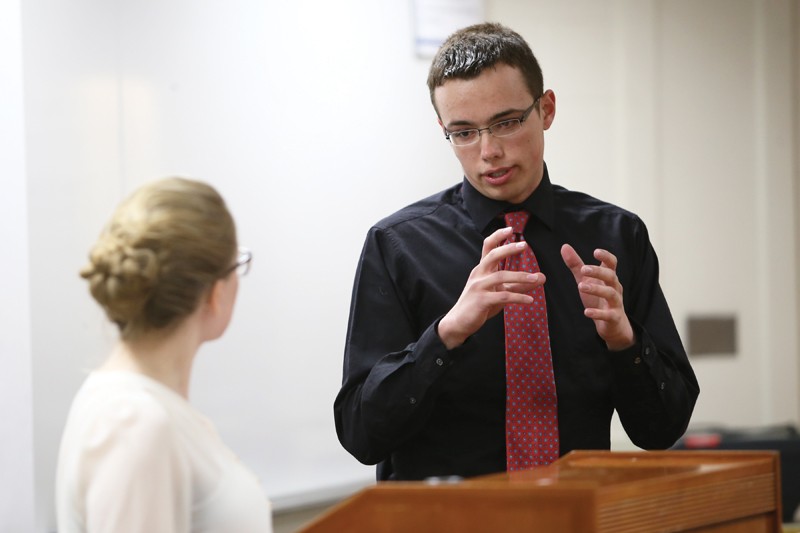GVSU, MSU offer different perspectives on controversial issue

GVL / Robert Mathews MSU student Mitchell Pawlak speaking to GVSU freshman Bailey Wright during the clarification session between panels.
Mar 17, 2013
The issue of abortion can be very controversial and difficult for people to decide where they stand.
A March 14 debate between Grand Valley State University and Michigan State University students brought about several different arguments in both support for and against abortion.
Brad Varner from MSU said that R.J. McVeigh from GVSU got in touch with Varner through Facebook.
“R.J. and I got in touch through a friend of a friend on Facebook about a year ago,” Varner said. “He messaged me on Facebook and we have had debates on several issues. Recently I posted a status about abortion, and R.J. was interested in having a debate on stage.”
Panel A was the anti-abortion group from GVSU, consisting of McVeigh and Bailey Wright from the Student for Life organization. Panel B had Varner and Mitchell Pawlak arguing in support of abortion.
Wright started out the debate with an opening statement touching on several reasons as to why abortion isn’t morally permissible.
“This is not about choice, reproductive rights, women’s rights or religion,” Wright said. “This debate is about what defines the unborn.”
Throughout her statement, she said there are a few criteria for defining the unborn. These criteria can be memorized with the acronym SLED; size, level of development, environment and degree of dependency.
Wright said the smaller size of an unborn baby doesn’t decrease the value of him or her and that the level of development of an unborn baby doesn’t decrease their value either.
“An 18-year-old has a more developed brain, reproductive system, and life experiences, but this doesn’t necessarily mean that an unborn baby has less value,” Wright said. “For degree of dependency, all of us depend on each other in equal amounts, with an unborn child it’s just higher because their younger, which again doesn’t decrease its value.”
Varner argued that an unborn baby and a human being are intrinsically different.
“In order for an organism or a person to be relevant to morality the person must have a functioning brain and have actual desires,” Varner said.
Varner added that a vast majority of people have abortions at 20 weeks, which is when the unborn child doesn’t have a fully developed brain.
“This doesn’t mean that having an abortion after 20 weeks is morally impermissible,” he said. “We must consider individual concerns on a case to case basis.”
To combat Varner’s arguments, McVeigh said that using the criteria of brain development, actions, and the ability to experience desires doesn’t constitute a person’s value.
“Everyone’s body functionalities are different, different people hold functions to different degrees, but that doesn’t make their value less,” he said.
In addition, he stated the importance of bodily autonomy, that the parents are responsible in the situation, and that it’s their responsibility to protect their unborn child.
Pawlak replied by emphasizing that a human should have characteristics such as the ability to love and think. In cases of rape, he said women shouldn’t have to feel like they have to save someone’s life, especially if it’s not theirs.
Toward the end of the debate, both Panel A and B gave their closing statements.
“Is it an adequate reason to kill an unborn person because of a lack of human desires and functions?” McVeigh said. “All humans have one thing in common and that’s human nature. A humanitarian society should be a fair, equal and loving society that doesn’t seek out boundaries that places some humans a head of others; we tear these wall downs.”
In Varner’s closing statement, he said the audience should keep in mind the desires and insights to a person’s well-being.
“Our actions shouldn’t be dictated on what could be or should be, our actions should be dictated on what our desires currently are,” Varner said.





















